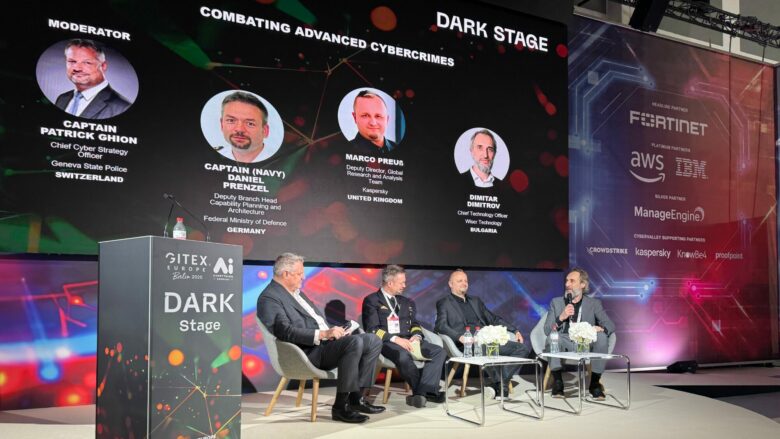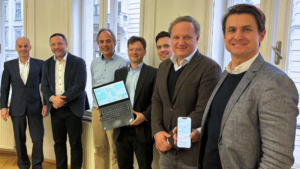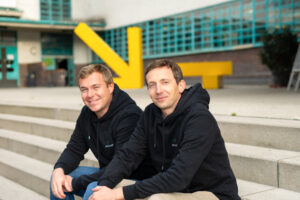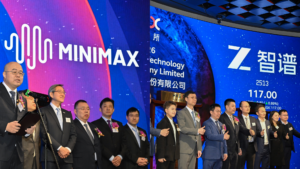How German-Bulgarian Tech Collaboration Strengthens EU Defense Autonomy

At GITEX EUROPE 2025 in Berlin, one of Europe’s largest emerging technology forums, defence and cybersecurity took centre stage amid growing geopolitical uncertainty. On a high-level panel exploring real-time cyber threats, Dimitar Dimitrov, General Manager of Wiser Technology’s Automotive, Aerospace & Defence unit, joined Capt. Daniel Prenzel of the German Federal Ministry of Defence, Capt. Patrick Ghion of the Geneva State Police, and Marco Preuss of Kaspersky to exchange strategic perspectives.
“Europe’s security depends on a robust, integrated ecosystem of innovative and agile technology companies capable of delivering next-generation defence solutions at scale”, said Dimitrov. “We are witnessing a clear shift towards distributed innovation networks, where companies across Europe collaborate to develop and deploy Software-Defined Defence capabilities.”
The session was part of Bulgaria’s #BreakingGrounds delegation — an initiative to spotlight leading national tech companies on Europe’s largest industry stages. But more than a showcase, the dialogue illustrated a deeper integration between the Central and Eastern European (CEE) and DACH defence ecosystems.
From dialogue to cooperation: CEE and Germany deepen strategic ties
According to a June 2025 report by The Recursive, over 170 defence and dual-use startups are now active in CEE, supported by a maturing base of technical expertise and institutional cooperation. Bulgaria is playing an increasingly visible role — not only through startups, but through cross-border industrial collaboration with German primes and research leaders.
This shift has institutional support. Earlier this year, at the German–Bulgarian Defence Industry Day, Major General Stefan Schulz of the German Federal Ministry of Defence described Bulgaria as “a proven and reliable partner with a growing strategic role in the Black Sea region”. The event also marked the announcement of a new Defence and Security Cooperation Advisor at the German Embassy in Sofia — a diplomatic role maintained in only a select group of strategic countries.
For companies like Wiser, these developments formalise partnerships that have been built over a decade of joint work with Germany’s defence-industrial base, including Rheinmetall, Hensoldt, Rohde & Schwarz, Fraunhofer, and DLR.
Wiser’s role in Europe’s evolving defence stack
While relatively unknown outside specialist circles, Wiser Technology has emerged as a key contributor to the software layer of EU and NATO defence systems. Certified under NATO AQAP 2110 and 2210, and cleared for national, EU, and NATO classified information, the company has participated in over a dozen major programs under the European Defence Fund (EDF), EDIDP, and NATO initiatives.
In the NATO AGS project, Wiser developed a mission-critical software system that enables the Main Operating Base to process live imagery and motion data from airborne radar systems and ground stations in near real-time. In ESC2/E2C coordinated by Indra with partners like Leonardo and Rheinmetall, Wiser is contributing to the development of a multi-domain command platform designed to unify operational coordination across European missions.
Meanwhile, MARTINA, an EDF project coordinated by Royal Netherlands Aerospace Centre (NLR), Wiser helps validate AI for satellite-based defense applications by delivering backend infrastructure for AI performance assessment and traceability. In ASTERION, the EDF-funded underwater communications initiative led by the Netherlands Organisation for Applied Scientific Research (TNO), Wiser contributes ultrasonic protocol expertise and system design for secure, multi-modal data transmission.
These projects reflect a broader transformation in European defence — from vertically integrated platforms to modular, real-time, AI-driven systems, enabled by high-trust, interoperable software from specialist engineering firms.
What comes next: From Berlin to Sofia
The visibility gained at GITEX EUROPE is just one step in a longer regional strategy. On 28 October 2025, the Regional Defence Tech Summit in Sofia, is expected to convene over 500 stakeholders from the European Commission, national defence officials, primes, research centres, and deep-tech startups. The summit will focus on:
- The shifting geopolitical order and the strategic role of the Black Sea
- Europe’s progress toward autonomous, interoperable defence capabilities
- The integration of AI, satellite, and cyber technologies into defence architectures
- Emerging models of cross-border industrial and technological collaboration
CEE × DACH: Europe’s Most Important Tech Merger Is Happening Now


























